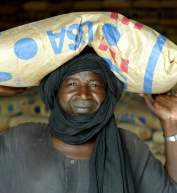Global Health

In alignment with the U.S. Global Health Initiative, USAID’s integrated health program focuses on three regions of Ghana—Greater Accra, Central Region and Western Region—which are home to more than a third of the national population. In these regions, USAID supports a combination of activities to improve the health behaviors of families and communities, the quality of health services and the overall health systems.
HIV/AIDS
Through the President's Emergency Plan for HIV/AIDS Relief (PEPFAR), USAID works with the Government of Ghana and other partners to strengthen service delivery, reform policies and coordinate financial commitments. USAID supports high quality programs with national coverage for most-at-risk populations, especially female sex workers, men who have sex with men, and their male and female partners and clients. These programs use peer educators and drop-in centers to communicate prevention messages and to create a link with clinical care. Strengthening systems and improving the quality of care are important to supporting the Government of Ghana in implementing its Global Fund-financed clinical programs. Other systems strengthening activities include support for policy reform, costing of activities and comprehensive logistical reform.
Malaria
Under the President's Malaria Initiative (PMI), USAID focuses on scaling up proven malaria control interventions targeting children and pregnant women. USAID, through PMI, has sprayed extensively for mosquitoes in the Northern Region and has trained health workers on malaria case management and prevention during pregnancy. To supplement this work, USAID provided over 1.7 million bed nets in 2010.
Maternal and Child Health
USAID promotes safe motherhood by supporting quality improvements in maternal and child health services during pregnancy, delivery and the postnatal period, and community outreach on the importance of using these health services. As a part of Feed the Future, USAID works with the Ghana Health Service to decrease malnutrition in children. Working with other donors, USAID has addressed severe acute malnutrition in 31 districts, reaching nearly 6,000 children. USAID also supports activities that increase awareness and use of voluntary family planning methods and improve the quality of family planning services.
Health Systems
In 2010, USAID supported the training of over 28,000 health care workers on health care delivery, quality assurance, data management and reporting. Improved management capacity at the regional and district level has resulted in better data quality and reporting in the Western Region, which in turn has provided important data on health trends and decreased waiting time in Greater Accra health facilities. USAID has also provided technical assistance to strengthen the public supply chain system for essential medicines and commodities.







Comment
Make a general inquiry or suggest an improvement.